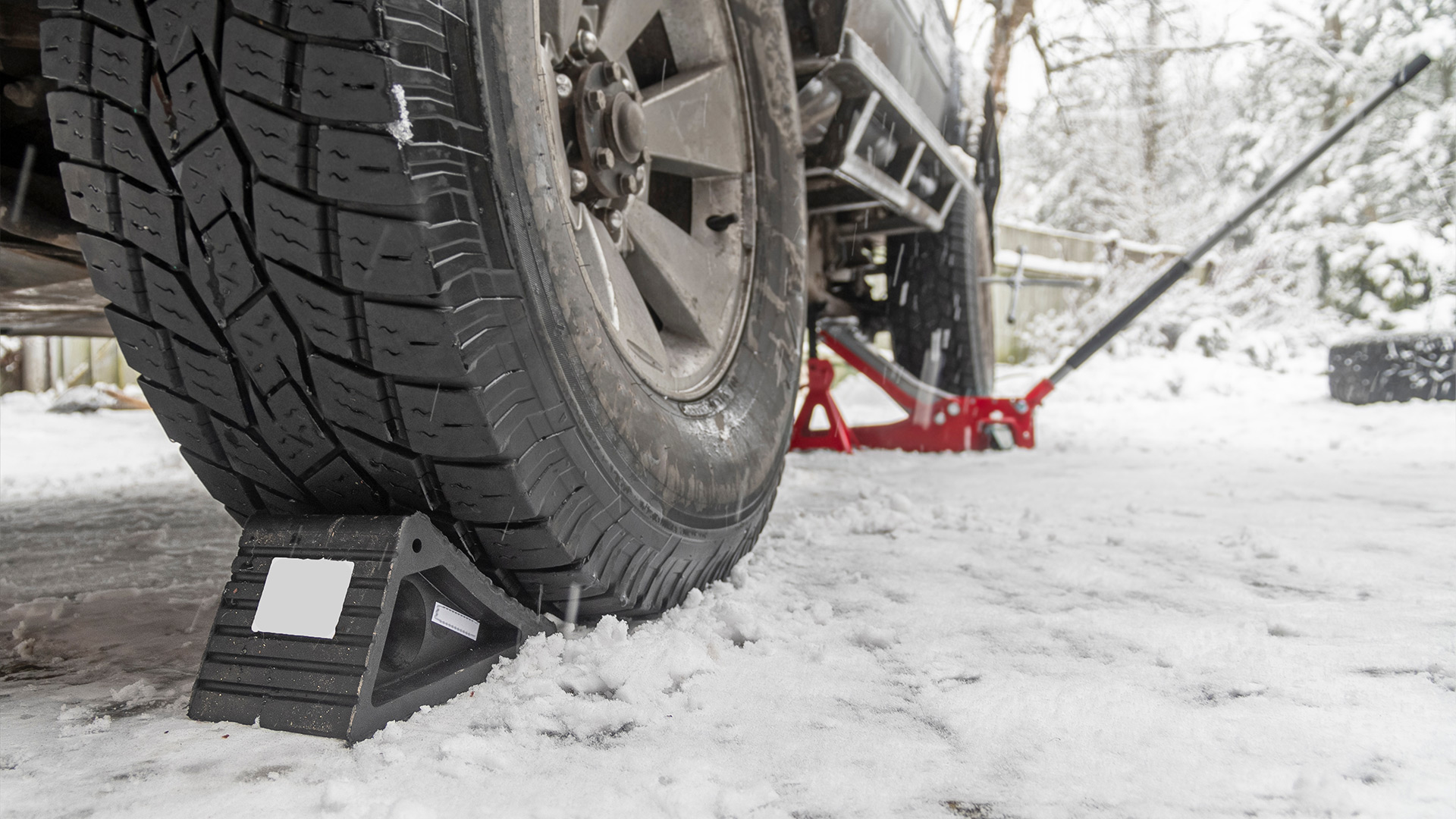Working on your car can be dangerous if you don’t take the right precautions. There are plenty of horror stories all around the internet that I don’t particularly recommend reading about, but if you like wrenching away on your car from the comforts of your own garage, it’s better to be safe than sorry. So far we’ve covered the best floor jacks and the best jack stands so you can safely get your car off the ground, but in both of those posts we mentioned the necessity of using wheel chocks, so it’s time for us to give our recommendations for the best wheel chocks.
While not as common at mechanics’ shops around the country and there’s even a possibility you’ve never seen them used, wheel chocks are an affordable tool that helps ensure your car doesn’t accidentally roll when you’re working on it. When it comes time to using a floor jack to get your car off the ground, don’t solely depend on your parking brake to keep it in place. Wheel chocks will stop the car from accidentally rolling, helping ensure that you’re safe to jack up your car to make way for jack stands before getting underneath it.
As you’ll be able to tell looking through our recommendations, wheel chocks aren’t exactly a high-tech tool and generally they’re all very similar. What you do want to avoid are poor quality wheel chocks, made from materials that aren’t durable. Plastic wheel chocks, for example, are something we’d recommend avoiding. We prefer solid rubber wheel chocks, although our best on a budget recommendation is constructed from heavy duty resin material. For the most part, however, most of our picks are similar and you’re safe to go with any of them.
That being said, we ranked our recommendations based on user reviews, the brand’s reputation, and general ease of use that includes how convenient it is to store the wheel chocks when they’re not being used. We also give some tips and information about wheel chocks following our list of recommendations.
1. Top pick: MaxxHaul solid rubber heavy duty wheel chocks (70472)
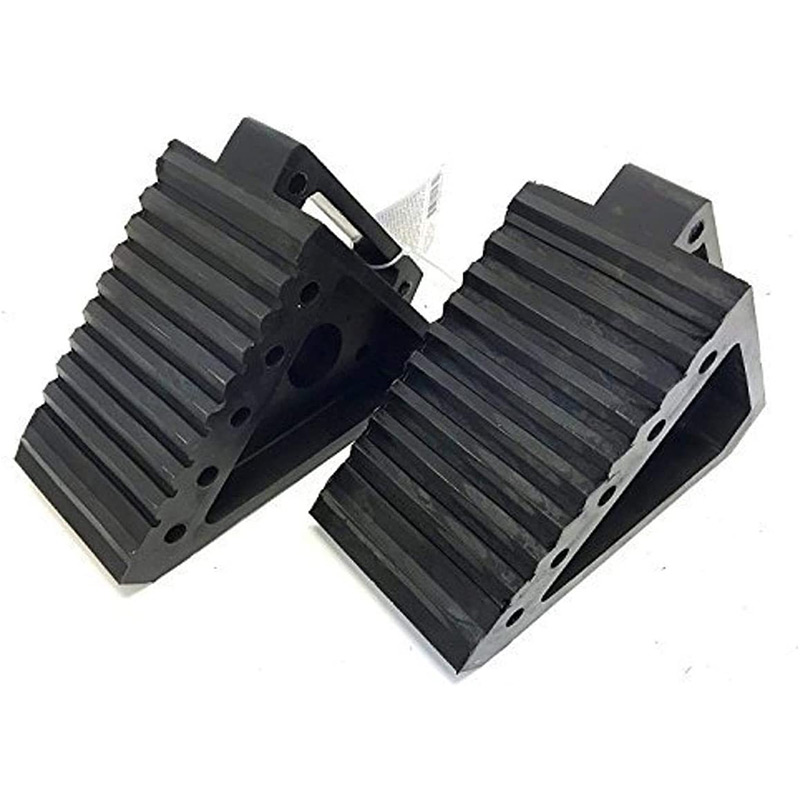
Pros
- Heavy-duty construction
- Great performance and durability
- Reputable manufacturer
Cons
- Strong rubber smell
- More expensive than other wheel chocks
These heavy duty wheel chocks from MaxxHaul are probably all you need, if you’re comfortable with spending the money. They are a bit more expensive for a two-pack than some of our other recommendations, but they come heavily recommended by users. Measuring approximately 8″ long by 4″ wide by 5″ tall, these wheel chocks feature all-weather construction and a rubber traction pad, as well as a built-in handle for easy transport. The rubber traction pad at the bottom has an oil resistant surface to further prevent any slippage.
MaxxHaul is a company that specializes in towing, cargo, and trailer equipment so it knows what it’s doing when it comes to hauling cargo. One thing to note, and it’s likely you’ll run into this on most rubber wheel chocks, is that they do have a strong smell.
2. Runner-up: AFA Tooling heavy duty rubber wheel chocks
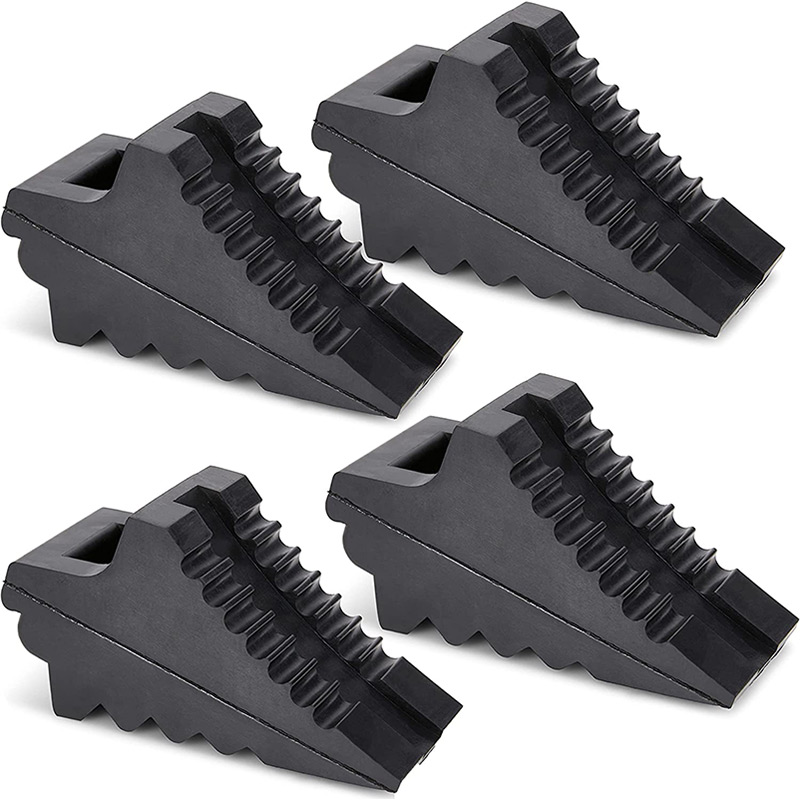
Pros
- Aggressive ribbed design
- Strong rubber construction
- Wide handles
Cons
- Pricey
- May not be suitable for larger/taller vehicles
This four-pack option comes from AFA Tooling, featuring an aggressive ribbed design and a textured bottom surface to prevent the chock from slipping. These are constructed from nylon-reinforced rubber, which AFA Tooling says makes them twice as strong as regular rubber. Each chock weighs about 3.5 pounds and have incorporated handles so they’re easy to grab. In addition, the handles are wide enough so you can rope the chocks together in pairs.
These chocks measure about 8″ long by 3.5″ wide by 4.5″ tall, which should be adequate for most vehicles.
3. Best on a budget: FloTool heavy duty wheel chocks (11930MI)
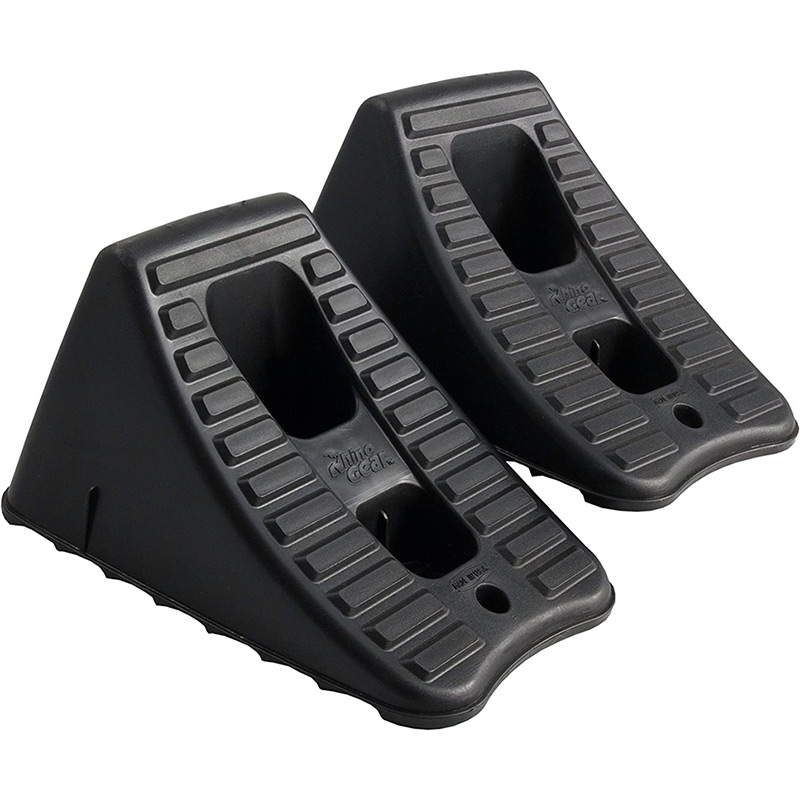
Pros
- Heavy-duty resin material
- Suitable for tires up to 20″ diameter
- Reputable company
Cons
- Resin may not provide same level of grip or durability as rubber
- Not ideal if your tires are larger than 20″ in diameter
As we mentioned in our introduction, these wheel chocks are made from heavy duty resin material rather than rubber, which explains the more affordable price tag. FloTool is a division of Hopkins Manufacturing, which specializes in towing products and accessories. One thing to note with this option is that it shouldn’t be used with tires larger than 20″ in diameter, so if your vehicle has larger wheels, you ‘ll want to go with a different, taller wheel chock.
We’d recommend this option for car owners who occasionally work on their car in a level garage, where it’s less likely their vehicle will accidentally roll. These are not intended for commercial use and are designed to help prevent your vehicle from rolling when you’re jacking it up.
4. Also consider: Performance Tool solid rubber wheel chock (W41001)
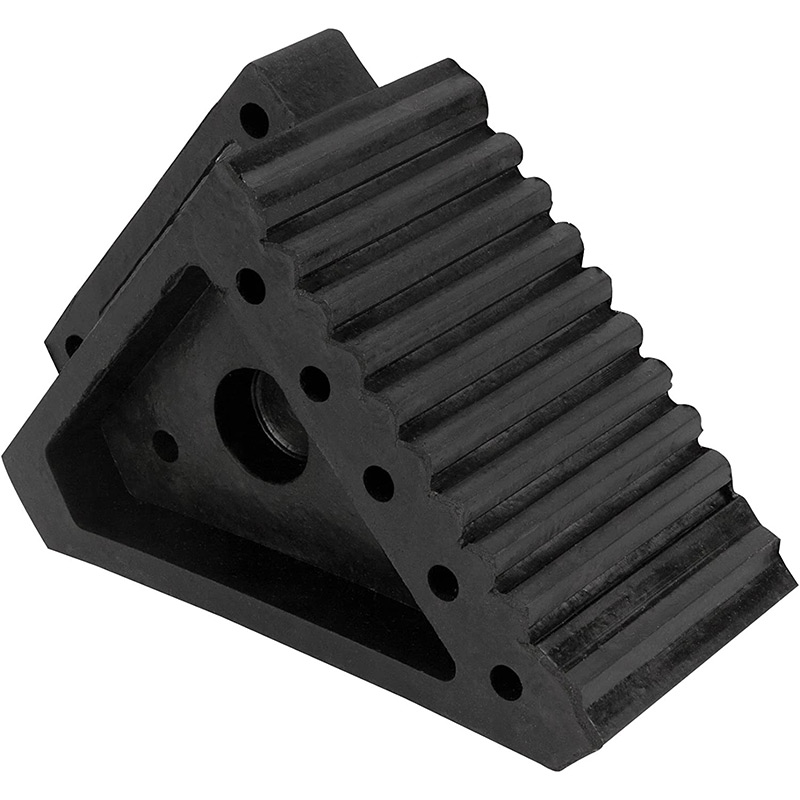
Pros
- Ideal for those who need a single unit
- Durable, resistant to wear and tear
- Built-in rubber handle
Cons
- Size may not be suitable for larger or heavier vehicles
- No extra stability features
If for some reason you only need a single wheel chock, take a look at Performance Tool’s offering. Although we do recommend purchasing wheel chocks in pairs, we understand some of our readers may be looking to replace just a single unit. This is an oil resistant rubber wheel chock that weighs less than five pounds with a built-in rubber handle. Each chock has a 45-degree slope angle and measures about 7.5″ long by 3.89″ wide by 5.875″ tall.
As its name suggests, Performance Tool specializes in workshop equipment and automotive tools, and is a division of Wilmar, LLC.
What are wheel chocks?
Wheel chocks are basically wedges of material that are placed against a vehicle’s wheels so that the vehicle doesn’t accidentally roll away. We recommend purchasing wheel chocks that are made of heavy duty rubber or resin.
Why do I need wheel chocks?
Even if you have your parking brake engaged, you should still use wheel chocks before lifting up your vehicle. If you have the rear of your car lifted off the ground and only the parking brake set, it’s possible that your vehicle can still roll on the front wheels and fall. Putting wheel chocks on the front wheels could prevent this from happening.
How many wheel chocks do I need?
At minimum, you want at least two wheel chocks depending on how you’re lifting your car off the ground. We recommend buying at least four, one for each tire, or pairing them up so you have two per tire.
When should I use wheel chocks?
You should use wheel chocks anytime you’re in a situation where your vehicle can accidentally roll away. This could be parking downhill or jacking up your car. We always recommend using wheel chocks if you plan on lifting your car off the ground.
How do I use wheel chocks?
Proper chocking is important to ensure safety. Here are some general tips on how to properly use wheel chocks:
- The wheel chock should be centered and squared with the tire
- Make sure the chock rests against the tire tread
- Always use wheel chocks in pairs
- Your wheel chocks should be positioned downhill and below the vehicle’s center of gravity
- If your vehicle is facing downhill, chock the front tires on each side
- If you’re working on an uphill grade, position the chocks behind the rear tires
- If you’re on a level grade, pair up the chocks on a single tire
